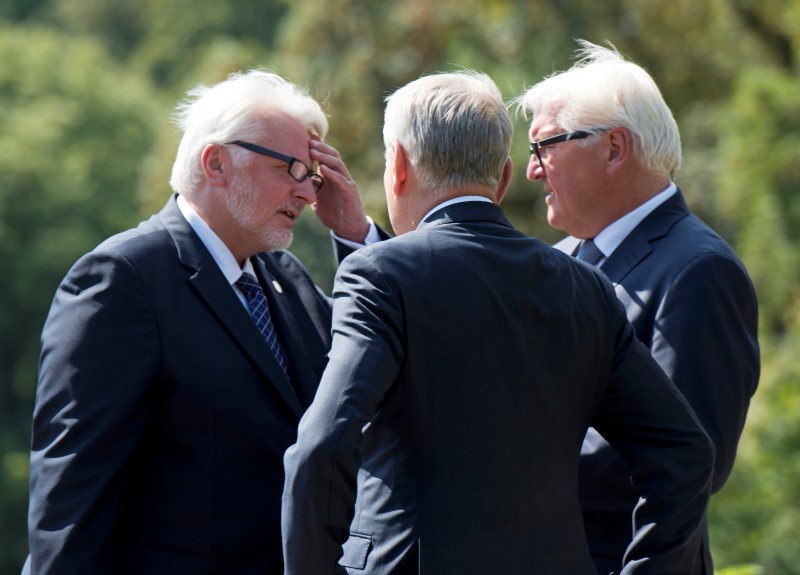By Andrea Shalal
WEIMAR, Germany (Reuters) - Germany, Poland and France vowed on Sunday to reinvigorate the "Weimar Triangle" group first formed 25 years ago after the end of the Cold War to help deal with the many challenges now facing Europe, including Britain's vote to leave the European Union.
German Foreign Minister Frank-Walter Steinmeier said the leaders of the three countries would meet before the end of the year, and his French counterpart, Jean-Marc Ayrault, said France would host the summit in November. The leaders of the Weimar Group last met, as a group, five years ago.
Steinmeier said the trilateral group had played a key role in achieving European integration, and could now help to answer the serious questions thrown up by Britain's June 23 vote to leave the EU.
"Britain's decision to leave the EU is the biggest challenge we face," Polish Foreign Minister Witold Waszczykowski told reporters. "Their decision reflects a mistake by the European Union, and we have to figure out how to correct the mistake."
Steinmeier acknowledged differences among the ministers on issues such as immigration, which were not the focal point of Sunday's meeting, but said they would meet more frequently in the future to work on those issues and many others.
"We need a capable and better European Union. We must show that Europe is of use to its citizens, with concrete and tangible measures and projects - be it in the areas of security, immigration or growth and employment," Steinmeier said during a joint news conference at Schloss Ettersburg, a castle near the city of Weimar, where the group was established in 1991.
In a five-page joint statement, the ministers acknowledged there were no simple answers for the problems facing Europe, but said they planned to show their citizens that the EU could achieve more as a bloc than the individual member countries could on their own.
"We are determined to tackle the problems together, in the spirit of a renewed mutual trust, since we are convinced that joint action of all the member states is the best option for the future," the ministers said in their statement.
They also said they planned to meet in larger groups with other countries, such as with the Visegrad Four, which is currently led by Poland and includes the Czech Republic, Hungary and Slovakia.
The ministers backed substantial steps to better integrate the security structures of member countries, and called for the European Council to hold yearly "European security council" meetings focused on domestic and external security questions.
The EU also needed a better structure to plan and execute the 11 civilian and six military missions it is currently carrying out on three continents, the ministers said, adding that such moves would help strengthen NATO.
A critical part of that effort was encouraging development of a strong and competitive defence industry in Europe.
Economic issues were also a key concern, the ministers said, and they called for greater efforts to promote innovation and make Europe more attractive to investors.

This meant accelerating work to harmonise tax and social structures, which would also make the EU more competitive internationally, they said.